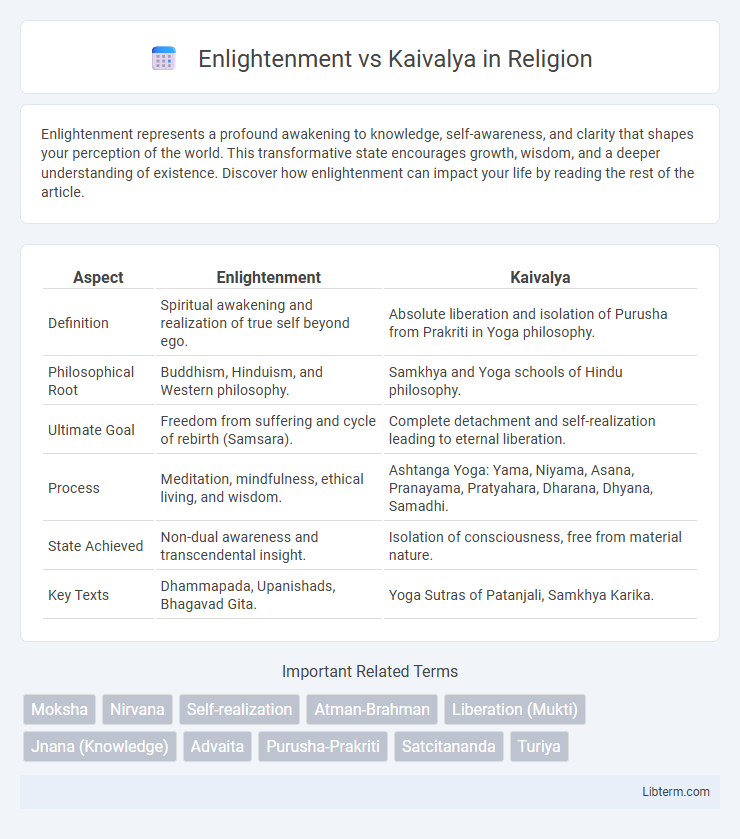Enlightenment represents a profound awakening to knowledge, self-awareness, and clarity that shapes your perception of the world. This transformative state encourages growth, wisdom, and a deeper understanding of existence. Discover how enlightenment can impact your life by reading the rest of the article.
Table of Comparison
| Aspect | Enlightenment | Kaivalya |
|---|---|---|
| Definition | Spiritual awakening and realization of true self beyond ego. | Absolute liberation and isolation of Purusha from Prakriti in Yoga philosophy. |
| Philosophical Root | Buddhism, Hinduism, and Western philosophy. | Samkhya and Yoga schools of Hindu philosophy. |
| Ultimate Goal | Freedom from suffering and cycle of rebirth (Samsara). | Complete detachment and self-realization leading to eternal liberation. |
| Process | Meditation, mindfulness, ethical living, and wisdom. | Ashtanga Yoga: Yama, Niyama, Asana, Pranayama, Pratyahara, Dharana, Dhyana, Samadhi. |
| State Achieved | Non-dual awareness and transcendental insight. | Isolation of consciousness, free from material nature. |
| Key Texts | Dhammapada, Upanishads, Bhagavad Gita. | Yoga Sutras of Patanjali, Samkhya Karika. |
Understanding Enlightenment: A Broad Overview
Enlightenment encompasses the awakening to ultimate truth and self-realization across various spiritual traditions, highlighting liberation from ignorance and suffering. It reflects a broad understanding of consciousness expansion, transcending the ego and material attachments. Kaivalya specifically refers to the absolute state of isolation or detachment in yogic philosophy, emphasizing complete freedom from the cycle of birth and death as the pinnacle of spiritual attainment.
Defining Kaivalya: Origins and Meaning
Kaivalya, rooted in ancient Yoga philosophy, signifies the ultimate state of isolation or liberation where the self is detached from material existence and mental fluctuations. Originating from classical Sanskrit texts like the Yoga Sutras of Patanjali, Kaivalya represents absolute independence and pure consciousness beyond the dualities of life. This concept contrasts with Enlightenment, which often emphasizes awakening or realization within the flow of existence, whereas Kaivalya marks complete transcendence and solitude of the soul.
Philosophical Roots: Eastern vs. Western Perspectives
Enlightenment in Western philosophy emerges from the Age of Reason, emphasizing individual autonomy, empirical knowledge, and rationality rooted in European thinkers like Kant and Locke. Kaivalya in Eastern philosophy, particularly Advaita Vedanta, focuses on liberation through self-realization and the dissolution of ego, derived from ancient texts like the Upanishads. These distinct philosophical roots highlight Western emphasis on cognitive enlightenment and Eastern pursuit of spiritual liberation.
Core Concepts: Moksha, Nirvana, and Kaivalya
Moksha, Nirvana, and Kaivalya represent ultimate spiritual liberation in Indian philosophies, each emphasizing freedom from the cycle of birth and death (samsara). Moksha in Vedanta signifies union with the divine and the realization of the self's unity with Brahman, while Nirvana in Buddhism denotes the extinguishing of desire and suffering, leading to cessation of rebirths. Kaivalya, central to Samkhya and Yoga philosophy, highlights absolute isolation of the purusha (self) from prakriti (matter), achieving pure consciousness and self-realization.
Enlightenment in Vedanta, Buddhism, and Jainism
Enlightenment in Vedanta is the realization of the self's unity with Brahman, transcending Maya and achieving Moksha through knowledge (Jnana) and meditation. In Buddhism, Enlightenment (Nirvana) is the cessation of suffering and the cycle of rebirth by overcoming desire and ignorance via the Eightfold Path. Jainism views Enlightenment (Kevala Jnana) as infinite knowledge and perception attained through strict ethical living, self-discipline, and renunciation, leading to liberation from karmic bondage.
Kaivalya in Classical Yoga Philosophy
Kaivalya in Classical Yoga Philosophy refers to the ultimate state of absolute independence and liberation from the cycles of birth, death, and karmic bondage, achieved through the cessation of all mental modifications (vrittis) as described in Patanjali's Yoga Sutras. Unlike Enlightenment, often viewed in broader spiritual contexts as awakening or illumination, Kaivalya specifically emphasizes the isolation of Purusha (pure consciousness) from Prakriti (material nature), resulting in pure, unattached consciousness. This state transcends dualities and afflictions, marking the complete dissolution of ego and the realization of the self's true nature beyond physical and mental constructs.
Pathways to Enlightenment: Practices and Approaches
Pathways to Enlightenment emphasize meditation, self-inquiry, and ethical living as core practices that cultivate awareness and transcendence of the ego. Kaivalya, rooted in Patanjali's Yoga Sutras, is achieved through rigorous discipline including the eight limbs of yoga, leading to isolation of the self from material existence. Both approaches prioritize detachment and realization of true consciousness but differ in methodologies and philosophical contexts.
The Experience: Similarities and Differences
Enlightenment and Kaivalya both represent ultimate states of consciousness characterized by self-realization and liberation from ignorance. Enlightenment, rooted in Buddhist and Hindu philosophies, emphasizes awakening to the true nature of reality and cessation of suffering through mindfulness and insight. Kaivalya, primarily discussed in the Yoga Sutras, denotes absolute isolation of the Purusha (self) from Prakriti (matter), resulting in absolute freedom and transcendence beyond dualities.
Ultimate Liberation: Goals and Outcomes
Enlightenment in spiritual traditions often refers to realizing profound wisdom and awakening to the true nature of reality, leading to liberation from suffering and the cycle of rebirth, commonly described as Nirvana or Moksha. Kaivalya, a concept primarily from Patanjali's Yoga Sutras, signifies absolute aloneness or isolation, representing the ultimate state of self-realization where the individual soul is completely detached from material existence and impurities. Both aim for ultimate liberation but differ in focus: Enlightenment emphasizes universal consciousness and liberation from ignorance, while Kaivalya centers on pure, individual self-identity free from all bondage.
Modern Interpretations and Relevance
Modern interpretations of Enlightenment emphasize cognitive awakening and self-realization as pathways to inner peace and universal compassion. Kaivalya, in contemporary contexts, is understood as absolute liberation from mental modifications and the cessation of suffering, aligning closely with psychological well-being and mindfulness practices. Both concepts maintain relevance by offering frameworks for personal transformation and holistic mental health in today's fast-paced world.
Enlightenment Infographic

 libterm.com
libterm.com